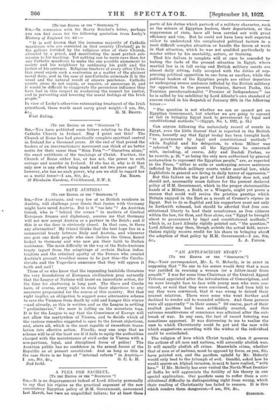" AN ANTI-PACIFIST STORY."
[To THE EDITOR Or THE " SPECTATOR."] Snz,—Your correspondent, Mr. L. G. Moberly, is in error in supposing that " No one in his senses would deny that a man was justified in rescuing a woman (or a fellow-man) from assault." I was for some time Chairman of the Central Appeal Tribunal appointed after the introduction of Conscription, and we were brought face to face with young men who were con- vinced, or said that they were convinced, or had been told to say they were convinced, that it was wrong to defend their nearest relatives. There were some who went further and declined to render aid to wounded soldiers. And these persons were all apparently " in their senses." Of course, part of their exalted pacifism had been artificially created, and this extreme sensitiveness of conscience was attained after the out- break of war. In any case, the fact of recent tutoring was sometimes apparent. It was distressing to me to realize the uses to which Christianity could be put and the ease with which suggestions according with the wishes of the individual could be assimilated.
The religion of love which Christ taught, when it governs the actions of all men and nations, will assuredly abolish war. It will equally abolish all crime. Meanwhile crime, whether that of men or of nations, must be opposed by force, as you, Sir, have pointed out, and the pacifism upheld by Mr. Moberly would only lead to the triumph of evil. Gandhi, asked how he would oppose an Afghan invasion, is said to have replied, " with love." If Mr. Moberly has ever visited the North-West frontier of India he will appreciate the futility of his theory in one special application. Our pacifists seem to suffer from a con- stitutional difficulty in distinguishing right from wrong, which their reading of Christianity has failed to remove. It is this which renders them dangerons.—I am, Sir, &c.,
SYDENHAM.


































 Previous page
Previous page